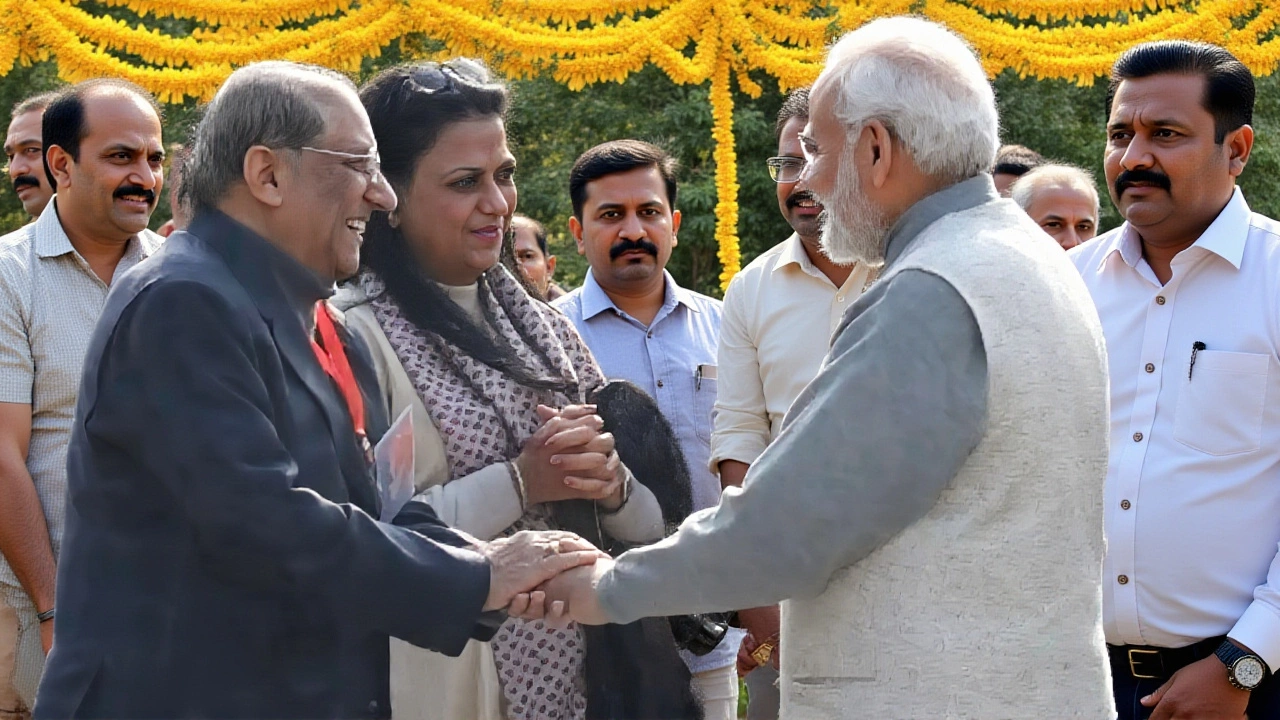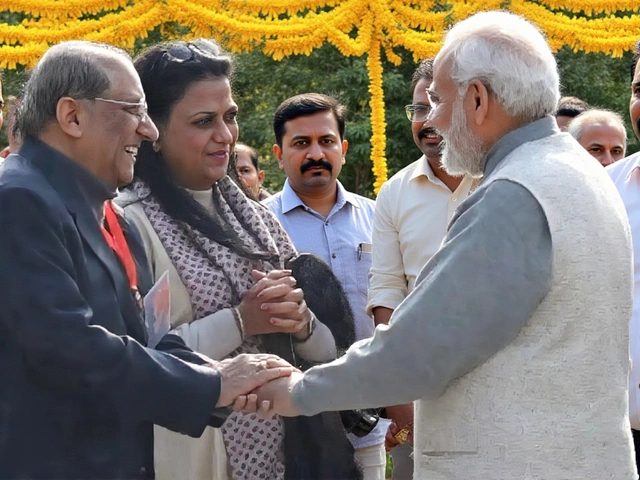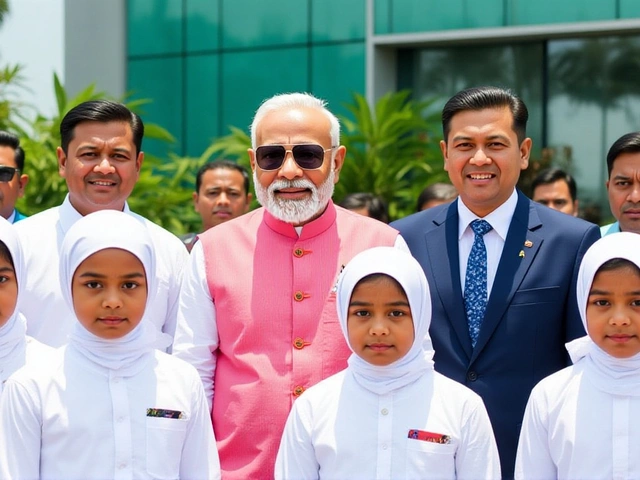
Veteran BJP Leader Vijay Kumar Malhotra Dies at 94, Shaping Delhi Politics for Five Decades
When Vijay Kumar Malhotra, the first president of the Bharatiya Janata Party's Delhi unit, slipped away on September 30, 2025, the city’s political landscape felt the loss of a living archive.
According to a statement from the Delhi BJP, the 94‑year‑old veteran died at his home in the early hours of Tuesday, though some reports say he was taken to All India Institute of Medical Sciences (AIIMS) in New Delhi before passing. Prime Minister Narendra Modi visited the family, calling Malhotra “a pillar of the party’s growth in the National Capital Territory.”
From Lahore Roots to Delhi's Political Arena
Born on December 3, 1931, in Lahore—then part of British India—Malhotra was the fourth of seven children of Kaviraj Khazan Chand. The Partition of 1947 forced his family to migrate to Delhi, a trauma that forged his lifelong commitment to nation‑building.
He entered public life in 1967, securing the role of Chief Executive Councillor (the de‑facto mayor) of the Delhi Municipal Corporation. That early experience gave him an intimate grasp of the city’s civic challenges, from water scarcity to slum rehabilitation, and set the stage for a career that would span more than five decades.
Building the Jana Sangh and the Early BJP in Delhi
Malhotra’s rise through the Jana Sangh ranks was swift. From 1972 to 1975 he served as president of the Delhi Pradesh Jana Sangh, laying organisational foundations that survived the Emergency and later morphed into the BJP.
When the Bharatiya Janata Party was formally launched in 1980, he was tapped to head its Delhi unit—not once, but twice, steering the party from 1977 to 1984. Working alongside contemporaries such as Kedar Nath Sahni and Madan Lal Khurana, Malhotra kept the BJP’s foothold alive during years when the party struggled to attract mass support in the capital.
Parliamentary Triumphs and Electoral Milestones
His electoral résumé reads like a master class in political endurance. A five‑time Member of Parliament and two‑time MLA, he won Delhi Sadar in the 9th Lok Sabha (1989‑1991) and South Delhi in the 14th Lok Sabha (2004‑2009). Yet the marquee moment came in the 1999 general election, when he defeated former Prime Minister Manmohan Singh by a margin of over 1.2 lakh votes. That victory cemented his reputation as a formidable campaigner.
In the 2004 polls, while the BJP lost all other Delhi seats, Malhotra was the lone victor, underscoring his personal brand of clean politics and deep grassroots connections. In 2008, the party named him its chief ministerial candidate for the Delhi Legislative Assembly election. He won the Greater Kailash constituency, but the BJP fell short of a majority. Demonstrating a rare willingness to put service over status, he resigned from his parliamentary seat to retain his MLA post and assumed the role of Leader of the Opposition.
Beyond Politics: Education, Sports, and Cultural Contributions
Malhotra’s interests stretched well beyond the corridors of power. He earned a doctorate in Hindi literature, championing language preservation programs in government schools. His love for sports manifested in presidencies of the All India Archery Association and the Indian Olympic Association, where he helped promote chess and archery among Delhi’s youth.
Colleagues often recalled his modest lifestyle—no luxury cars, a simple diet, and an office that resembled a community centre more than a political headquarters. This simplicity earned him admiration across party lines and made him a go‑to mentor for younger BJP aspirants.
Reactions and Reflections on a Storied Career
Prime Minister Modi’s condolence note praised Malhotra as "a stalwart who forged the BJP’s identity in Delhi with honesty and dedication." Senior BJP leader Manoj Tiwari called him "the elder statesman whose wisdom guided us through tough elections." Even opposition figures, such as Arvind Kejriwal, the Chief Minister of Delhi, highlighted his "unwavering commitment to democratic debate."
The Delhi BJP’s official statement described his life as "an example of simplicity and public service," noting that his mentorship helped shape leaders like Ravi Kishan and Sanjay Singh. The party announced a memorial lecture series in his honor, to be held annually at the National Museum, New Delhi.
What Lies Ahead for Delhi BJP?
With Malhotra’s departure, the Delhi BJP faces a generational shift. Analysts point to a potential vacuum in mentorship, prompting senior leaders to accelerate talent‑scouting programs. The party’s upcoming municipal elections will test whether his legacy of ground‑level organization can be replicated by the younger cadre.
- Key dates: Born 1931 (Lahore), migrated 1947, first elected 1967, BJP Delhi president 1977‑1984, defeated Manmohan Singh 1999, died 2025.
- Major offices: Chief Executive Councillor, MLA (Greater Kailash), MP (Delhi Sadar, South Delhi).
- Notable achievements: Only BJP MP to retain a Delhi seat in 2004, led opposition in Delhi Assembly.
- Contributions beyond politics: Doctorate in Hindi, headed All India Archery Association, promoted chess.
Frequently Asked Questions
How did Vijay Kumar Malhotra impact the BJP’s growth in Delhi?
Malhotra’s early work as Delhi Jana Sangh president and later as the BJP’s first Delhi chief helped build a party infrastructure when the BJP had few elected representatives. He recruited grassroots workers, organized neighborhood meetings, and mentored future leaders, allowing the party to transition from a fringe group to a dominant force in the capital.
What was the significance of his 1999 victory over Manmohan Singh?
Defeating a future prime minister by more than 120,000 votes highlighted Malhotra’s personal appeal and signaled the BJP’s rising strength in urban constituencies. The win boosted the party’s morale ahead of the 1999 national elections and cemented his reputation as a heavyweight campaigner.
Did his work in sports administration influence Delhi’s youth culture?
As president of the All India Archery Association and a senior figure in the Indian Olympic Association, Malhotra championed school‑level archery and chess programs. Several Delhi schools now host annual archery tournaments that trace their origins to initiatives he launched in the early 2000s.
What challenges does the Delhi BJP face after his death?
The party must replace his mentorship role, which many younger leaders relied on for strategic guidance. With municipal elections looming, the BJP will need to translate his grassroots methodology into a modern digital outreach strategy to stay competitive.

Caspian Harrington
Hi there! My name is Caspian Harrington and I'm a blogger who specializes in entertainment, fashion, and beauty. I have a passion for writing about films, especially those that intertwine style and artistry in unique ways. With a keen eye for detail, I enjoy analyzing movie costume design and exploring the influence of fashion on the big screen. Join me as I dive into the cinematic world and share my thoughts on everything from classic films to the latest blockbusters.
About
Welcome to Filmy Haven India, your ultimate destination for the latest in Indian cinema, reviews, and entertainment news. Immerse yourself in the world of Bollywood, Tollywood, and more, as we bring you exclusive content, interviews, and updates on your favorite stars and movies. Join our vibrant community of passionate film buffs and celebrate the magic of Indian cinema with Filmy Haven India.

